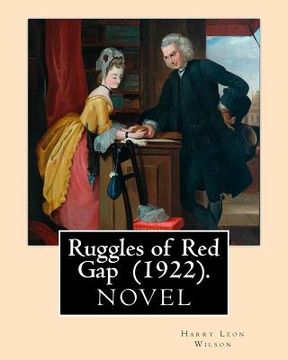Ruggles of Red Gap (1922). By: Harry Leon Wilson: Harry Leon Wilson (May 1, 1867 - June 28, 1939) was an American novelist and dramatist best known f (en Inglés)
Reseña del libro "Ruggles of Red Gap (1922). By: Harry Leon Wilson: Harry Leon Wilson (May 1, 1867 - June 28, 1939) was an American novelist and dramatist best known f (en Inglés)"
Harry Leon Wilson (May 1, 1867 - June 28, 1939) was an American novelist and dramatist best known for his novels Ruggles of Red Gap and Merton of the Movies. His novel Bunker Bean helped popularize the term flapper. Life and career: Harry Leon Wilson was born in Oregon, Illinois, the son of Samuel and Adeline (née Kidder). Samuel was a newspaper publisher, and Harry learned to set type at an early age. He began work as a stenographer after leaving home at sixteen. He worked his way west through Topeka, Omaha, Denver, and eventually to California. He was a contributor to the histories of Hubert Howe Bancroft, and became the private secretary to Virgil Bogue. In December 1886, Wilson's story The Elusive Dollar Bill was accepted by Puck magazine. He continued to contribute to Puck and became assistant editor in 1892. Henry Cuyler Bunner died in 1896 and Wilson replaced him as editor. The publication of The Spenders allowed Wilson to quit Puck in 1902 and devote himself full-time to writing. I had to live ten years in New York. It was then a simple town, with few street lights north of Forty-second street. Now the place is pretty terrible to me, perhaps the ugliest city in the world. I decided that the only way to get out of New York was to write a successful novel. So I tried with The Spenders and when I got a substantial advance from publishers, I quit my job and beat it for the high hills of Colorado. -Harry Leon Wilson Wilson returned to New York where he met Booth Tarkington in 1904, and Tarkington and Wilson traveled together to Europe in 1905. The two completed the play The Man from Home in 1906 in Paris. The play was a resounding success and was followed by more collaborations with Tarkington, but none repeated the success of the first. Wilson was elected to the National Institute of Arts and Letters in 1908. Wilson returned from Europe and settled permanently into the Bohemian colony at Carmel-by-the-Sea, California, which included among its artists and literati Jack London, Mary Hunter Austin, George Sterling, Upton Sinclair, Xavier Martinez, Ambrose Bierce, Alice MacGowan, Sinclair Lewis, Francis McComas, and Arnold Genthe. It was during this period that Wilson wrote the books for which he is most well known, Bunker Bean (1913) and Ruggles of Red Gap (1915). After a brief stint in Hollywood, he composed Merton of the Movies in 1922. In 1912 Wilson married Helen MacGowan Cooke, the daughter of Grace MacGowan and the niece of Alice MacGowan. Two years later, when someone attempted to murder Alice by poison and steal her diamonds and cash, her nephew Wilson and writer Jimmy Hopper became amateur detectives, but the perpetrator was never discovered. Certainly the most embarrassing event in Wilson's life occurred in March 1922 when he fought and lost a highly publicized "duel of fists" with the noted landscape painter Theodore Morrow Criley. Carmel was collectively humiliated when the sordid details of their long-standing feud made banner headlines in the San Francisco press and was given prominent coverage across the country on the International News Wire, including stories in the Los Angeles Times and New York Times. It was revealed that their argument had its origins with "a light romantic" love scene between Criley and Wilson's wife in the 1921 production of Pomander Walk at Carmel's Forest Theatre.[6] The resentful Wilson sent Criley a series of accusatory letters, including a twenty-four page invective, and demanded satisfaction in this "affair of honor." After three months of physical training and instruction in boxing in Honolulu Wilson returned and the two men met on "a high cliff overlooking the sea" where Criley thrashed the writer in ten minutes. A severe auto accident in 1932 greatly affected his health during his remaining years, and he died of a brain hemorrhage on June 28, 1939 in Carmel.

